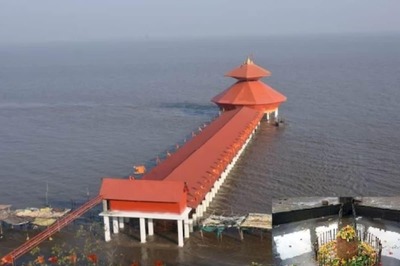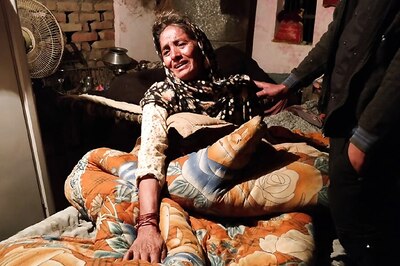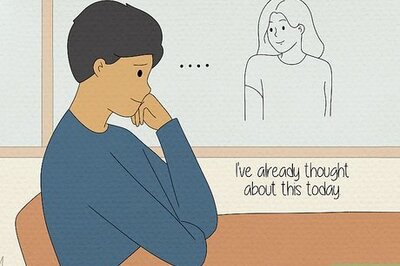
views
To say that she oozes class would be no exaggeration. Despite all the noise that’s made about male-female inequality in India, here’s one lady, who, with neither guns nor missiles, having neither political clout nor family riches, can hold your attention to ransom for never ending periods of time.
She’s a lady who truly proves that the pen IS indeed mightier than the sword. I never imagined that I would, after a single read of one of her essays, completely change my stand on one the biggest socio-political crises of the country. And yet the miracle happened.
My hard core pro-capitalistic feelings were simply blown to smithereens by the shear force of that one single essay. The lady in question is Arundhati Roy and the event I refer to is the Narmada Valley development project. In those extremely rare political and philosophical discussions that arise in college these days, I’d always maintained that I was strictly a right-winger and had no sympathy whatsoever for the socialists and even less for the communists.
The central themes of this piece of “text”, which, after reading the Mrs Roy’s classic, I simply cannot call an “essay”; are these: • Is the larger good of the “rest of Indian” people more important than the aspirations of a select class of the poor and the downtrodden ? • Is this an indication of the widening cracks in the democratic establishment of India? • Is India too big and populous a country for democracy to work? • If yes, what is the alternative? The plot for this piece came into being when I was traveling from Madras to Hyderabad on the 24th of January this year.
I’d arrived at the airport two hours in advance and as is my habit, walked into Higginbotham’s book store. Browsing through the Indian authors’ section I picked up a book titled “The algebra of infinite justice”, a collection of Arundhati Roy’s political essays.
The first essay I read was called “The end of imagination” which she’d written after the Pokhran nuclear test. I didn’t quite agree with the philosophy of what she was trying to convey, which was; in very BOLD letters: Nuclear weapons are bad. Yes, per se, but when you consider that being nuclear capable is the only way to get noticed and attract global attention these days and once you factor in the threat of the Chinese nuclear arsenal and America’s growing proximity to Pakistan during the pre 9/11 times, I believe that nuclear weapons are a boon to the country. If you’re an avid book reader, you’ll know darn well how difficult it is to continue to a read a book whose philosophy you don’t agree with.
However, it was the way she finished off her essay that made the hair on my back stand. “If you are religious, then remember that the nuclear weapon is man’s challenge to God: Everything you created; we can destroy. If you are not religious, then realize: The Earth took 4600 million years to form. It could end this afternoon”.
I started reading the next essay called “For the greater common good” just as the aircraft was about to take off. I don’t want to bore you with the details of the Narmada development project. But the crux of the matter is this: The project WILL displace, without adequate compensation close to a million people who have lived on and lived off their land for generations.
They are the oldest inhabitants of this land. And yet fickle minded “engineers” and “far-sighted politicians” have not bothered to think twice before kicking them out of what is rightfully and lawfully their land. For detailed statistics and for a comprehensive collection of the instances of corruption that’s rampant in the project, Please visit the website of the Narmada bachao Aandolan (NBA) at www.narmada.org I intend to use this tragedy as a launching pad for the more central theme of this text: Democracy, and why she’s failing us? History books will tell you that democracy had its origins in ancient Greece. Sparta, Athens and other city states were the first democracies in the truest sense of the word.
But these city states were microscopic in comparison to what India is today. A variation of this, called a “republican” system formed the basis of the administrative system of pre-Caesarean Rome. But as Rome grew in size, power and population, so did the cracks in its republican frame work. Corruption is the by-product of democracy. It took an emperor of Caesar’s stature to restore Rome to the glorious state that we admire today. And even after Caesar’s death, Rome did NOT have a purely democratic government.
The reigns of Rome passed through the hands of the wise Octavius, the eccentric Nero, the heroic Vespesius and Titus and the all-conquering Constantine. While Rome grew and prospered to newer heights under each of its dictators, periods between the death of one emperor and the anointment of the next were marked by civil war, wide spread anarchy and chaos. A large democratic setup left to itself rots and decays in the absence of a strong ruler.
But how does the concept of a ruler get incorporated into a democratic framework? Preach democracy to any of the millions displaced by Narmada Valley Project (NVP) and he’ll tell you this: “Democracy in India only caters to the whims and fancies of the elite and ruling classes” though off-late even the middle class seem to be getting a fair share of our politicians’ attention. I’d read in my high school civics text book that protecting the rights of the minorities was a sacred duty of a democracy.
Why then are our politicians oblivious to this? Why is it that we have become so arrogant as to assume that the rights of a richer man are more valuable than that of a poor man? How is it that India is turning into one gigantic Orwell-ian Animal farm with some people becoming “more equal” than others. I read an article today how one of the country’s most loved and respected figures preferred to be gifted a Rolls Royce instead of being paid for acting in a soon to be released movie just so he could save a whopping 1.2 crore rupees in taxes.
Does he have any idea how many hungry mouths can be fed by 1.2 crore rupees? Does he realize that there are people in the Narmada valley who are so uneducated and downtrodden that they probably do not even appreciate how much a crore rupees is. If the rich do not pay taxes, then who will? If the elite want tax cuts and sops, why shouldn’t the marginalized demand quotas? It’s a vicuous circle this; though I’d like to go on record saying that I’m against quotas.
Our fetish for development has driven us to the borders of intellectual sanity and moral sanctity. We set-up Special Economic Zones (SEZs ) on farmlands, drive farmers out of fertile lands so that MNCs can set up “1-lakh rupee” car factories, sell valuable Iron mines to Korean companies, and all this in the name of development!! Journals today are filled with self-gloating articles on “India’s amazing march towards super-powerdom, of stunning double digit growth rates, and how we are catching up with China.
In the words of Aerosmith, “Dream on…” It ain’t gonna happen. Not today. Not tomorrow. Not even in this decade. It’s not called pessimism. It’s called common sense and prudence. Certain political parties will tell you how “India is shining”(wtf?), show you pictures of a smartly dressed farmer with a cell phone in hand, post the same silly phrase on every available TV network and bill board and get away with ad-expenditure criminally running into crores of rupees, all taken from the general coffers, all from taxes the common man pays, all from monies that certain actors do not pay. And yet we gloat gloat and gloat.
We gloat over our imperfections, we gloat over our double standards, we gloat over how smart we must be to attract so much FDI. We shamelessly disgrace our ancestors by printing smart-ass T-Shirts that say: “India’s contribution to Mathematics – A big zero” Jeez! We’re the most brilliant people ever to inhabit India. We’re the hub of the BPO industry! BPO this BPO that. Learning fake accents, changing names from Krishna to Chris, BPO is the modern day hooker business. You work by night. The pay is good. You service a lot of customers.
Congratulations. Foreign banks and Investment banks happily lend us money, fully knowing that when its pay back time, we can cough up only business deals and concessions and not the cash itself; how can you tax a man who has nothing? For it’s a mathematical impossibility. How can you tax a rich and famous actor or cricketer?
For that would be political suicide. An ironic dilemma. Consider the case of Singur. Some of the most fertile land from the Rice belt of West Bengal is being given to the Tatas for setting up a car factory. Will the farmers of Singur ever be able to afford a car even if it costs 100,000 rupees plus taxes? Notice again the irony here.
A middle class person has to cough up taxes for purchasing an Indian-make 1 lakh rupee car whereas some people get away with what I consider to be no less than tax fraud running into crores of rupees and end up owning a foreign make car! Ah sweet democracy! Thou art indeed fled to beastish hearts. Is there no other piece of land left in the country for the Tatas to set up their factory on?
Surely there’s no dearth of infertile land, surely there’s no dearth of land that’s either too inaccessible or inhospitable for farming. Why can’t you set up factories there? You don’t need fertile soil to grow tyres and suspensions, but just try farming in the salt pans or on leached land. I spit on the system that breaks the back of the poor for the sake of that extra decimal place on the growth rate figure. I spit on the system that sells out its own people and resources and yet continue to blame Britain and Pakistan for all its miseries.
Thank God British colonization delayed the advent of Indian democracy by two hundred years. Can you imagine where we’d stand if that were the case? No we can’t; for we are yet ill-equipped to face insanity. But maybe in a decade’s time we will be ready. We HAVE to be. The Anthropic principle states that : “The world is the way it is, for if it were different, we wouldn’t be here to observe it.” The India-specific Anthropic principle would run like this: “India is the way it is, for if it were not, we would not be alive to observe it” Is it Anti-Indian to criticize the present state of Indian democracy? Is it true, as Bush will tell you; that “You are either with us, or with the terrorists” Is there no middle ground? Why can’t we simply send a “We are sorry for your loss” card to the US President and get over with it?
With all due respect to those who lost their lives to 9/11, terrorists have killed a much larger number of people in India. Do we go bombing Bhutan because of that? You might ask how Bhutan comes into the picture of international terrorism?.
But then, I beg of you, How does Iraq? Do you remember Roosevelt mourning over the Jallianwala bagh massacre? I don’t, but Nehru didn’t brand him a terrorist for that, did he?. Nor can I recollect a precedence to a nation razing entire civilizations to the ground over an irrational unfounded fear that is conceived, in the first place by the mating of its own foreign policy and its greed for oil. I’m not anti-Indian. I’m not anti-American. I just want to live out my life time in peace, living only in life and dying only in death. Is that too much to ask?



















Comments
0 comment